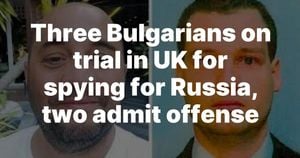Businessman Leo Kryss is at the center of a high-stakes lawsuit against the real estate firm Douglas Elliman, claiming they withheld key information during the sale of his luxury Miami mansion, which was sold for $79 million. This case takes a twist as it involves none other than Amazon founder Jeff Bezos, who allegedly purchased the property through trusts, never publicly disclosing his identity during the negotiations.
Kryss, who co-founded Tectoy, a Brazilian toy and electronics company, sold the opulent 7-bedroom, 11.5-bathroom home situated at 12 Indian Creek Island Road, located within the notoriously exclusive and affluent Indian Creek Village, often referred to as “Billionaire’s Bunker.” The mansion was initially listed for $85 million before Kryss lowered the price following discussions with Douglas Elliman’s Florida CEO, Jay Parker.
When Kryss asked Parker directly if Bezos was the buyer behind the offer for his property, he alleges he received repeated affirmations, misleading him to believe Bezos was not interested. According to the lawsuit, which was filed recently due to what Kryss claims are Parker’s misrepresentations, he agreed to reduce the price by $6 million based on this information. The lawsuit asserts, "But for these misrepresentations and reliance upon [Jay Parker's] duties to deal honestly, fairly, and with due care... Kryss would not have reduced the purchase price or sold the home for $79,000,000."
According to the complaint obtained by multiple news outlets, Kryss sought assurance about Bezos's involvement because of the tech mogul’s previous acquisition of the adjacent lot at 11 Indian Creek Island Road for $68 million just prior to the sale of Kryss’s mansion. This raises eyebrows: considering the close proximity of the properties, Kryss believed Bezos' interest could affect the negotiations significantly.
The real estate market for high-end properties frequently involves customers working behind the curtains—trusts and business partnerships often hide the true buyers’ names, and it's common for brokers not to reveal details about who is actually putting money down for these exquisite homes. According to Kryss’s lawsuit, this practice was exemplified by the trust through which Bezos had bought the mansion.
The claim emphasizes the importance of knowing the identity of potential buyers during negotiations, highlighting Kryss’s assertion: "Kryss believed it was highly material to his negotiations and his decision on the ultimate sales price of the home to know whether Bezos was interested..." Since Bezos’s acquisition of Kryss’s former estate would have added considerable value, the lack of transparency is at the crux of the complaint.
Jeff Bezos is not just the richest man on the block; as per the Bloomberg Billionaires Index, he's the second-richest person globally with a staggering net worth of $202 billion, giving him the financial firepower to buy properties worth tens of millions without breaking much of a sweat. Meanwhile, Douglas Elliman’s commission from the sale, reported to be around 4% of the transaction price, indicates they earned over $3 million from this high-profile deal, raising questions about their responsibilities to their clients.
While Jeff Bezos hasn’t publicly responded to this lawsuit, Douglas Elliman has refrained from commenting on any legal proceedings, stating they are unable to discuss active litigation. Despite this, the firm is facing scrutiny over practices concerning disclosure during property negotiations.
The lawsuit, filed with Miami-Dade County’s 11th Judicial Circuit, seeks more than $750,000 as damages, alleging breach of contract, breach of fiduciary duty, and negligent misrepresentation by Douglas Elliman. This case has ruffled feathers not only within the real estate circles but has also drawn attention from everyday observers intrigued by the extravagant lifestyles of tech executives and the luxurious properties they acquire.
Kryss’s legal team argues: "Douglas Elliman failed to fulfill their duties to our client," and they believe the facts laid out within the complaint are compelling enough to support their case against the giant real estate brokerage. Their claim hinges on whether Parker knowingly misinformed Kryss about the identity of the buyer, and whether Kryss would have proceeded with the sale if he had known the truth.
Beyond the courtroom intricacies, this case reflects the recurring theme present in real estate dealings—trust and transparency challenge conventional practices. There’s no doubt about it: deals often hinge on the tiniest details and, as found here, the identities of buyers can make the difference between millions of dollars.
This lawsuit is likely to resonate within the high-end real estate market and may set precedents related to disclosure standards, particularly as property transactions continue to draw the eye of wealthier buyers who prefer anonymity.
With the growing complexity surrounding ownership structuring and representation within estate dealings, what does this mean for future buyers and sellers? Stay tuned for how this legal battle plays out and its potential impact on the broader real estate industry.



